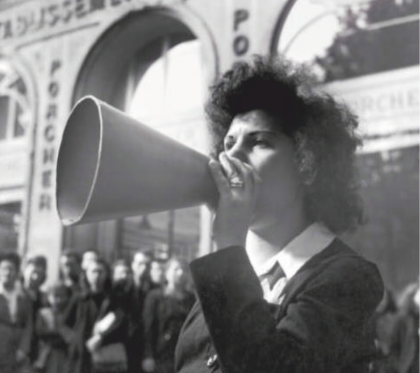Lily Lian (née Liliane Lebon), the last chanteuse on the streets of Paris, died on May 24th, aged 103
莉莉·利昂(原名莉莉安·勒邦)是巴黎最后一位街頭女歌手,她于5月24日去世,享年103歲。
The first of May had a special place on Lily Lian’s calendar. It was her birthday, to begin with. It was also May Day, the workers’ holiday, when she would sing revolutionary songs at the Communards’ Wall, the Mur des Fédérés, in Père Lachaise cemetery. Her father, a fighter in the Resistance, was buried close to it with other communist heroes. She felt proud to salute him, even if her view of him was scarred by bitter rows. And May Day was the fête du muguet, when strolling vendors sold lilies-of-the-valley to passers-by. These sprang up in the woods, and so had she, a love-child conceived in some mossy corner near Versailles.
五月一日在莉莉·利昂的日歷上有一個(gè)特殊的位置。首先,那天是她的生日。那天也是五一勞動(dòng)節(jié),是工人們的節(jié)日,她會(huì)在巴黎公社社員墻——拉雪茲神父公墓——唱革命歌曲。她的父親是一名抵抗運(yùn)動(dòng)的戰(zhàn)士,和其他共產(chǎn)主義英雄一起被埋葬在這座紀(jì)念碑附近。她覺得向他致敬很自豪,盡管她對(duì)他的看法已經(jīng)被激烈的爭(zhēng)吵損害了。五月一日也是五朔節(jié),到處溜達(dá)的小販向過路的人兜售鈴蘭。它們是在樹林里長(zhǎng)出來(lái)的,她也一樣,一個(gè)在凡爾賽附近長(zhǎng)滿青苔的角落里懷上的私生女。
She and the flower-sellers often found themselves together by the Wall. The Mur des Fédérés was a fine place to sing, though she had others. La Madeleine drew wedding crowds and glowing-after-mass congregations. Railway stations were good, especially if they had arcades for shelter when it rained, though a rainy day was a washout, generally. Her favourite pitch was the Barbès-Roche-chouart metro station, by the grilles where passengers changed from the surface to the underground line.
她和賣花的人經(jīng)常出現(xiàn)在公社墻邊。巴黎公社社員墻是個(gè)唱歌的好地方,盡管她還有其他可以唱歌的地方。貝特拉姆卡吸引了大批的婚禮人群和聚集在一起的人群。火車站很好,特別是如果那里有下雨時(shí)可以避雨的拱廊的話,盡管雨天通常都很糟糕。她最喜歡的地方是巴貝斯-羅奇-朱厄特地鐵站,地鐵站的格柵處是乘客從地面換乘地鐵的地方。

There she would stand with her group—two or three musicians, with a friend to hawk the scores—and sing through her tin megaphone the people’s favour- ites. These hardly varied over the years: “Le chant des Partisans”, “Le petit vin blanc”, “On boit l’café au lait au lit”, time and again to the crowd until they all joined in. It was not a grand living, but it was decent. She was not begging, which was important, since begging was not allowed. The trade was strictly regulated by the préfecture de police, with a permit needed to sing, and by the groups themselves, who drew numbers out of a hat each week to allocate their pitches.
她會(huì)和自己的團(tuán)體站到一起-兩三個(gè)音樂家,有一個(gè)朋友在她的錫擴(kuò)音器里大聲宣揚(yáng)人民的恩寵。這些年來(lái)幾乎沒有變化:《游擊隊(duì)的吟唱》,《小白葡萄酒》,《牛奶咖啡色》,一次又一次地對(duì)著人群歌唱,直到他們都加入進(jìn)來(lái)。這不是什么有氣派的生活。但是這是正派的生活。她沒有乞討,這很重要,因?yàn)槠蛴懯遣槐辉试S的。該行業(yè)受到當(dāng)?shù)鼐觳块T的嚴(yán)格監(jiān)管,唱歌需要許可證,他們每周從帽子里抽出數(shù)字來(lái)分配他們的表演地點(diǎn)。
譯文由可可原創(chuàng),僅供學(xué)習(xí)交流使用,未經(jīng)許可請(qǐng)勿轉(zhuǎn)載。












